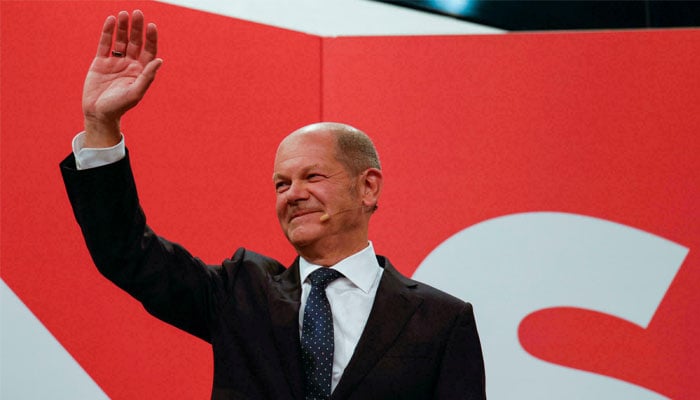ext govt
WorldAFPOctober 16, 2021



BERLIN, Oct 16 (NNN-AGENCIES) — German Finance Minister Olaf Scholz took a step toward succeeding Angela Merkel as chancellor, as his Social Democrats, the Greens and liberal FDP announced a preliminary deal to form a new government.
The three parties have been holding talks since Scholz’s centre-left Social Democratic Party (SPD) won the general elections on Sept 26 with Merkel’s conservatives in second place as she prepares to leave politics.
“We can sense here that a new beginning is possible, brought about by the three parties that have come together here,” Scholz told reporters.
He said the preliminary agreement “clearly shows that a government that aims to ensure we achieve progress can be formed in Germany”.
Greens co-leader Annalena Baerbock said the initial deal heralds a “coalition of progress” to “really use the next decade as a decade of renewal”.
The agreement that will form the basis of formal coalition talks all but means that Merkel’s CDU-CSU alliance is headed for the opposition benches after scoring their worst post-war election result.
CDU leader and chancellor hopeful Armin Laschet had recently said his party remains open to forming a governing coalition, but even his own job is hanging on a thread.
Facing their worst crisis in decades, the conservatives are planning a clean sweep of their leadership, with a congress by December to elect their new bosses.
Scholz, who is also Merkel’s vice chancellor, this week voiced confidence that the three-way talks involving his party will produce Germany’s next government before Christmas.
A coalition of SPD, Greens and FDP has found favour with Germans, with 62 percent supporting it as the next federal government, according to a poll published Friday.
Scholz’s approval rating was even higher, with three in four saying it was “good” for him to become chancellor.
The imminent shift in Germany’s leadership to the centre-left comes as Europe’s biggest economy is grappling with the complex challenge of securing the country’s post-pandemic recovery.
Raw material and component shortages are already crimping growth, with factories of Germany’s vital automotive industry idled because of the supply issues.
And a planned zero-emissions target by 2045 will require huge investments, including building more sustainable energy capacity and greener transport options.
In their initial agreement, the three parties pledged massive investments and less red tape to prepare Germany for a greener and more digital future.
But they vowed not to introduce any tax hikes and to maintain Germany’s cherished no-new-debt rule, something the FDP had signalled was a red line for them.
The Greens meanwhile secured a pledge to bring forward Germany’s exit from coal energy by eight years to 2030.
And the Social Democrats took the prize of raising minimum wage to 12 euros — a campaign promise pushed by Scholz.
During the formal negotiations, possibly starting next week, the parties will examine the finer details on how to finance Germany’s path towards a no-emissions future.
All sides are eager to avoid a repeat of the 2017 election aftermath, when the FDP dramatically walked out of coalition talks with the conservatives and the Greens and it took months for a new government to take shape. — NNN-AGENCIES
